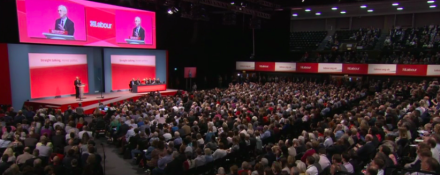
It’s the middle of a leadership election but Labour’s rival wings are already focussed on what happens when annual conference starts, literally the day after the result of the leadership race is announced.
Annual conference will have a big say over Labour’s internal rulebook – which we know from recent NEC meetings about the leadership ballot is of critical importance to the balance of power within the party. As the National Policy Forum has not been convened since Jeremy Corbyn became leader it will also provide a first opportunity for grassroots input into the party’s policy direction. It isn’t just the votes for and against policies that are critical, even the priority ballot to decide what gets debated is highly political, as was seen last year when delegates voted to avoid a divisive conference debate on Trident renewal – something Corbyn supporters may be keen to do this year as three of the biggest unions (GMB, Unite and USDAW) are committed to oppose Corbyn’s call for unilateral disarmament.
CLP delegates at the conference also elect a member of the National Constitutional Committee (NCC) – a battle between former MP and Corbyn supporter Chris Williamson and incumbent Maggie Cosin. The NCC deals with the most complex and contentious disciplinary issues and expulsions.
All of this happens whichever of Jeremy Corbyn or Owen Smith wins and could either give them a launch pad for a honeymoon period or if it calls wrong, damage their term of leadership in its first week.
The composition of conference looks rather balanced. Unions hold 50 per cent of the votes and a left block led by Unite and CWU will be set against a Corbyn-sceptical block led by GMB and USDAW, with Unison playing the pivotal role. The 50 per cent of the votes held by delegates elected by CLPs at local meetings in January to June 2016 looks broadly similar, perhaps a little to the left, to the CLP delegates sent in recent years – Momentum victories in some areas have been offset by greater moderate organisation in others.
On my wing of the party Progress and Labour First have teamed up to take a roadshow to a number of cities in the run up to Labour party conference – Birmingham, Brighton, Cardiff, Leeds, London, Manchester, Nottingham and Southampton – to discuss what we expect on the conference floor, what the main issues surrounding Labour party conference are likely to be and the rule changes and policy motions we anticipate. There is more information about these events here.
Rule changes can be put before conference and recommended by the NEC at any point in the run up to conference, and the NEC meets in the week before conference, the day before, and each morning as necessary. It’s the outgoing NEC that holds office until the final day of conference, not the new, slightly more pro-Corbyn representatives elected this summer. It will therefore be as difficult to predict whether the finely-balanced NEC will advance pro-Corbynite or anti-Corbynite rule changes as it was to predict how the votes would go in the crucial pre-leadership ballot vote.
We know that the Corbyn-supporting Campaign for Labour Party Democracy will be pushing a particular set of rule changes as these have been published online. The headline proposal is what Caroline Flint, in a piece for the next Progress magazine, calls the “McDonnell amendment” (because it would allow John McDonnell to get on the ballot paper) – the attempt to bring the nominations threshold down to just 5 per cent of MPs in a post-Corbyn leadership contest. On the other wing of the party Tom Watson has signalled that there is potential for a move by some unions to reintroduce the electoral college, whereby MPs, union members and party members would each have 1/3 of the vote in a future leadership contest. Some MPs are also keen to restore their right to elect the shadow cabinet.
Contemporary policy motions can be submitted by CLPs – which are allowed to meet for this purpose with clearance from their regional office, despite the current moratorium on local meetings – and affiliates – up until 15 September.
These motions have to relate to issues that have newly arisen since the publication of the National Policy Forum’s Annual Report on 5 August. The conference arrangements committee – consisting of five reps from the major unions, plus Michael Cashman and Gloria De Piero elected by party members last year – decides whether motions meet this criteria. The unions and other affiliates then pick four topics to debate – usually reflecting the industrial and employment priorities of the biggest unions, and the CLPs pick another four topics, which are less easy to predict and this ballot is usually a left-right battle.
As well as CLPs generating their own motions based on what’s the hot issue locally, interest groups within the party – factions on both wings and single-issue campaigns like the Campaign for Nuclear Disarmament – circulate “model motions” which they hope CLPs will submit.
With so much that could happen at conference, the leadership election results, whilst they will set the tone for week, may very quickly be overtaken in news value and political significance by the outcome of one of these other tussles in the struggle to determine the direction Labour goes in.




More from LabourList
‘Unity or division’: Starmer’s message to voters in Gorton and Denton
Almost half of Labour members oppose plans to restrict jury trials, poll finds
‘How Labour can finally fix Britain’s 5G problem’